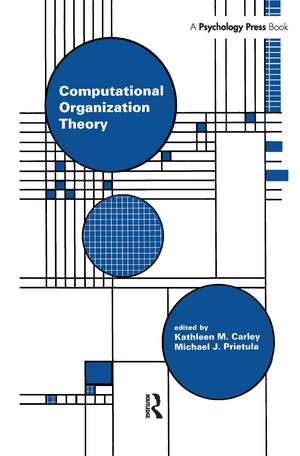Computational Organization Theory
Editat de Kathleen M. Carley, Michael J. Prietulaen Limba Engleză Paperback – 11 iul 2016
Authored by leading researchers in the area of computational organization theory, the various chapters demonstrate the value of computational analysis for organizational theory and advance our understanding of the relationship between organizational design and performance. This book contains both theoretical and methodological contributions that enable organizational theorists to use computational and mathematical techniques to systematically address the complex relationships that underlie organizational life. It also presents new -- or sometimes, renewed -- approaches on how to conduct organizational research from multiple formal perspectives including: simulation, numerical analysis, symbolic logic, mathematical modeling, and graph theory.
Preț: 325.34 lei
Preț vechi: 371.71 lei
-12% Nou
Puncte Express: 488
Preț estimativ în valută:
62.27€ • 64.76$ • 52.18£
62.27€ • 64.76$ • 52.18£
Carte tipărită la comandă
Livrare economică 13-27 martie
Preluare comenzi: 021 569.72.76
Specificații
ISBN-13: 9781138971400
ISBN-10: 1138971405
Pagini: 336
Dimensiuni: 152 x 229 mm
Greutate: 0.45 kg
Ediția:1
Editura: Taylor & Francis
Colecția Psychology Press
Locul publicării:Oxford, United Kingdom
ISBN-10: 1138971405
Pagini: 336
Dimensiuni: 152 x 229 mm
Greutate: 0.45 kg
Ediția:1
Editura: Taylor & Francis
Colecția Psychology Press
Locul publicării:Oxford, United Kingdom
Public țintă
ProfessionalCuprins
Contents: R.M. Cyert, Foreword. K.M. Carley, M.J. Prietula, Introduction: Computational Organization Theory. R.E. Levitt, G.P. Cohen, J.C. Kunz, C.I. Nass, T. Christiansen, Y. Jin, The "Virtual Design Team": Simulating How Organization Structure and Information Processing Tools Affect Team Performance. K. Crowston, Evolving Novel Organizational Forms. H. Verhagen, M. Masuch, TASCCS: A Synthesis of Double-AISS and Plural-Soar. K.M. Carley, M.J. Prietula, ACTS Theory: Extending the Model of Bounded Rationality. D. Krackhardt, Graph Theoretical Dimensions of Informal Organizations. Z. Lin, A Theoretical Evaluation of Measures of Organizational Design: Interrelationship and Performance Predictability. M. Verkama, R.P. Hämäläinen, H. Ehtamo, Modeling and Computational Analysis of Reactive Behavior in Organizations. H.H. Baligh, R.M. Burton, B. Obel, Validating an Expert System That Designs Organizations. T.K. Lant, Computer Simulations of Organizations as Experiential Learning Systems: Implications for Organization Theory. N.S. Glance, B.A. Huberman, Social Dilemmas and Fluid Organizations. D.K. Gode, S. Sunder, Human and Artificially Intelligent Traders in Computer Double Auctions. P. Shi, P.B. Luh, D.L. Kleinman, Team Coordination Under Individual and Team Goals. G.E.G. Beroggi, W.A. Wallace, A Decision Logic for Operational Risk Management.
Recenzii
"This is a useful contribution. The models are interesting and suggestive of promising further work."
—Canadian Artificial Intelligence
"Professors Carley and Prietula have done the field of organization theory a great service by putting this selection of chapters together....an excellent summary of the computational approach....In the new approaches represented in this book, the incentive for the simulations comes to a much greater extent from artificial intelligence and its derivative, expert systems....more than a series of chapters on organizational design. A wide range of topics in organizational theory is considered."
—Richard M. Cyert
Carnegie Mellon University, from the Foreword
—Canadian Artificial Intelligence
"Professors Carley and Prietula have done the field of organization theory a great service by putting this selection of chapters together....an excellent summary of the computational approach....In the new approaches represented in this book, the incentive for the simulations comes to a much greater extent from artificial intelligence and its derivative, expert systems....more than a series of chapters on organizational design. A wide range of topics in organizational theory is considered."
—Richard M. Cyert
Carnegie Mellon University, from the Foreword
Notă biografică
Kathleen M. Carley, Michael J. Prietula























